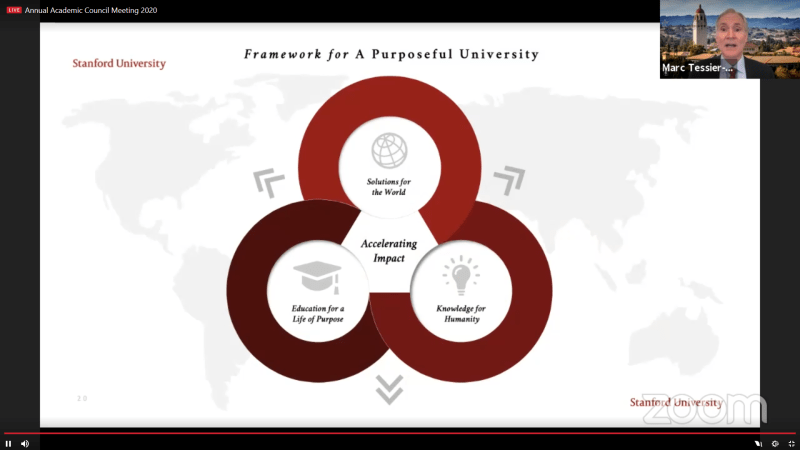Stanford will create a school focused on climate and sustainability, University President Marc Tessier-Lavigne announced at the annual meeting of the Academic Council, which includes all faculty and some research fellows. The school is one of the recommendations made by the president’s Faculty Committee on the Organizational Structure for Stanford’s Sustainability Initiative, convened as part of the Long-Range Planning process.
Kam Moler, vice provost and dean of research, and Stephan Graham, dean of the School of Earth, Energy & Environmental Sciences, will lead the team tasked with figuring out how to assemble the school.
Noah Diffenbaugh, professor of earth system science and co-chair of the president’s faculty committee highlighted the importance of the school in the context of a pandemic.
“The interconnectedness that we’re seeing in this pandemic shines a light on many of the challenges of sustainability, equity of resources and the extreme inequity that we have now,” Diffenbaugh said. “This has big implications for resilience to climate disasters, for preservation of biodiversity and for the trajectory of energy resources and climate change in the future.”
Tessier-Lavigne also addressed concerns about launching the school during the pandemic.
“Although we’re launching this effort in a time of fiscal constraint, due to the coronavirus pandemic,” he said, “I believe it’s important to us this period to put in place the structures that will enable our long term success and enable the initiative to prosper.”
The president’s faculty committee recommended two organizational structures: a new “College of Global Sustainability” and the option chosen by the University, a “21st-century school for a 21st-century challenge.” In a letter to faculty members, Tessier-Lavigne cited “a new and unfamiliar organizational structure that might take years to fully implement,” as one of the drawbacks of the college.
Also at the Academic Council meeting, Chaitan Khosla, director of the interdisciplinary institute Chemistry, Engineering & Medicine for Human Health (ChEM-H), highlighted the work of the Innovative Medicines Accelerator (IMA) an initiative that aims to bring together resources from across the University to speed up the process by which medicines that have already been discovered can be developed to treat human patients.
Khosla highlighted two aspects of the drug development process that the IMA aims to accelerate: drug prototyping and experimental human biology. While the IMA was started before the pandemic, as part of the Long-Range Planning process, Khosla highlighted the ways it has been able to help with Stanford’s response to the crisis.
“COVID-19 has turned out to be an important way for us to be able to test the concept and the and and the mechanisms of the IMA in a manner that very few people could have predicted might happen,” Khosla said. “Both the drug prototyping pillar and the experimental human biology pillar are contributing very critical functions that allow the IMA to support various aspects of Stanford’s response to the COVID-19 pandemic.”
Contact Michael Espinosa at mesp2021 ‘at’ stanford.edu.
